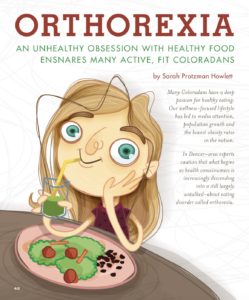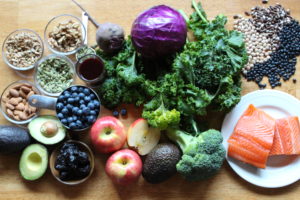Orthorexia: An unhealthy obsession with healthy food ensnares many active, fit Coloradans | by

Many Coloradans have a deep passion for healthy eating: Our wellness-focused lifestyle has led to media attention, population growth and the lowest obesity rates in the nation. Denver-area experts caution that what begins as health consciousness is increasingly descending into a still largely untalked-about eating disorder called orthorexia.
Growing Concern

The term, coined in 1997 by Colorado Dr. Steven Bratman, literally means “righteous eating.” It’s a quest for dietary perfection that consumes one’s daily routine — while exacting a physical and social toll.
More than 20 years after its recognition, orthorexia is still not an official diagnosis of the National Eating Disorders Association, and without a set of diagnostic criteria, studies on its prevalence are nonexistent.
Erin Carpenter, a licensed clinical social worker and founder of Thrive Counseling in Denver, says that already fit and athletic women 20 to 40 years old are increasingly symptomatic of orthorexia.
Carpenter says one in four of her patients exhibit orthorexic tendencies. She calls it the “nothing is healthy enough” point of view. Sufferers might fixate on the food situations they’ll encounter each day and worry whether the options will be pure or perfect enough, which is ultimately isolating.
“If you can’t go with your friends to the movies or a restaurant because of the food options,” Carpenter says, “that can lead to depression and loneliness.”
Fixated on Food

Orthorexic people may also find themselves judging what others eat, she says, while cutting out more and more foods from their diet and over-exercising to compensate for perceived slips.
With so many Coloradans vocal about and proud of their eating habits, experts are careful to note that a balanced pursuit of quality, healthful food is not orthorexia.
And while Carpenter says many popular regimens aren’t necessarily to blame, she sees many vegetarian, vegan, paleo, raw-food and “clean” eating devotees start to restrict even further and slip into orthorexia.
“The culture is conflating food with morality, and the clean/dirty food thing is very toxic,” she says. “If we talk about ‘clean eating,’ whatever is not ‘clean’ is dirty and bad. This all-or-nothing way doesn’t reflect how our bodies actually work. No food is bad.”
Janelle Hunt, a registered dietician at Sollus Nutrition Therapy in Denver, says the search for identity is often a trigger for orthorexic behavior, which she sees in many of her mid-20s female patients.
“It gives them a sense of being good at something,” Hunt says. “It’s a visual thing others can see and you get status for it. If you’re not sure what you’re good at, you can cling to those food rules and become really good at that. They’ll go no sugar, no gluten, then from vegetarian to vegan — until soon they’re only eating vegetables.”
Reexamining the ‘Food Rules’

These days, many social media influencers with no nutritional certification are pushing the elimination of perfectly fine foods, Carpenter says, which can encourage orthorexia and other forms of disordered eating. She prefers the advice of registered dieticians like Hunt, who steers her clients toward studies in medical journals.
“I want them to see whether studies have actually backed something up,” Hunt says. For example, the need to stop eating carbs or sugar — or if these are just fads.
For most of us, enjoying a wide range of foods bodes well for mental and physical health.
“We all have preferences of food we like to eat, but if food is set before us and this causes anxiety, this is not normal,” Hunt says. “We need to start working through the rules around that food, and why food is holding so much power over us.”[
The Orthorexia Overlap with Anorexia

While symptoms like dry skin and hair, lack of menstruation and being underweight can coincide with orthorexia, it differs from anorexia, the widely known eating disorder that centers on restricting food quantity.
“People are ashamed of their anorexia, but they actively evangelize their orthorexia,” wrote Dr. Steven Bratman, who coined the term in the late 90s and updated his observations in a 2016 blog post, reflecting on the rise of orthorexia and the distinctions between the two eating disorders.
“People with anorexia skip meals; people with orthorexia do not (unless they are fasting). Those with anorexia focus only on avoiding foods, while those with orthorexia both avoid foods they think are bad and embrace foods they think are super-healthy (such as the ubiquitous kale). And when an anorexic person is in treatment, they have no particular objection to being fed with Ensure or Boost except regarding the calories, whereas an orthorexic person would object to the chemicals.”[
Are you or someone you know orthorexic?
Tags: Eating disorder, Orthorexia
Leave a Comment
Please be respectful while leaving comments. All comments are subject to removal by the moderator.
